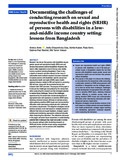| dc.contributor.author | Amin, Amina | |
| dc.contributor.author | Das, Adity Shayontony | |
| dc.contributor.author | Kaiser, Adrita | |
| dc.contributor.author | Azmi, Raia | |
| dc.contributor.author | Rashid, Sabina Faiz | |
| dc.contributor.author | Hasan, Md Tanvir | |
| dc.date.accessioned | 2022-05-25T05:59:37Z | |
| dc.date.available | 2022-05-25T05:59:37Z | |
| dc.date.copyright | 2020 | |
| dc.date.issued | 2020-12-17 | |
| dc.identifier.citation | Amin, A., Das, A. S., Kaiser, A., Azmi, R., Rashid, S. F., & Hasan, M. T. (2020). Documenting the challenges of conducting research on sexual and reproductive health and rights (SRHR) of persons with disabilities in a low-and-middle income country setting: Lessons from Bangladesh. BMJ Global Health, 5(12) doi:10.1136/bmjgh-2020-002904 | en_US |
| dc.identifier.uri | http://hdl.handle.net/10361/16672 | |
| dc.description | This article was published in BMJ Global Health by BMJ Journals [© Author(s) (or their employer(s)) 2020. Re-use permitted under CC BY-NC. No commercial re-use. See rights and permissions. Published by BMJ.] and the definite version is available at: http://dx.doi.org/10.1136/bmjgh-2020-002904 The Journal's website is at: https://gh.bmj.com/content/5/12/e002904 | en_US |
| dc.description.abstract | Research has shown that persons with disabilities require
greater sexual and reproductive health (SRH) care and
services than persons without disabilities. However, this
need is often neglected in most of the low-and-middleincome countries including Bangladesh. There is also
a dearth of research and data relevant to this issue. A
nationwide mixed-methods research has been conducted
to explore persons with disabilities’ specific sexual and
reproductive health and rights (SRHR) needs, health
seeking behaviour related to SRH and barriers in accessing
SRH services, along with the associated factors that
influence their SRH outcomes. The purpose of this paper is
to discuss the challenges encountered by the researchers
while conducting this research and the strategies adopted
to resolve those challenges. Some of the challenges
experienced by the researchers include development of
appropriate tools with questions on sensitive SRHR topics,
obtaining informed consent, difficulty to maintain privacy
while exploring sensitive SRHR issues and communication
difficulties when interviewing individuals with intellectual
and sensory impairments. The mitigation strategies include
iterative revisions of all tools based on multiple pretests in
different filed sites and expert feedback, strategic rapport
building and maintaining appropriate contextual etiquette
while conducting the interviews. The reflections discussed
in this paper will assist future researchers in understanding
potential field challenges they might encounter in similar
low resource settings while conducting research on
SRHR and similar sensitive issues among marginalised
population groups, such as persons with disabilities. | en_US |
| dc.language.iso | en_US | en_US |
| dc.publisher | BMJ Journals | en_US |
| dc.relation.uri | https://gh.bmj.com/content/5/12/e002904 | |
| dc.subject | Challenges of conducting research | en_US |
| dc.subject | Sexual and Reproductive Health and Rights (SRHR) | en_US |
| dc.subject | Disabilities | en_US |
| dc.subject | Low Middle Income country | en_US |
| dc.subject | Bangladesh | en_US |
| dc.title | Documenting the challenges of conducting research on sexual and reproductive health and rights (SRHR) of persons with disabilities in a lowand-middle income country setting: Lessons from Bangladesh | en_US |
| dc.type | Journal Article | en_US |
| dc.description.version | Published | |
| dc.contributor.department | Brac James P. Grant School of Public Health | |
| dc.identifier.doi | http://dx.doi.org/10.1136/bmjgh-2020-002904 | |
| dc.relation.journal | BMJ Global Health | |

